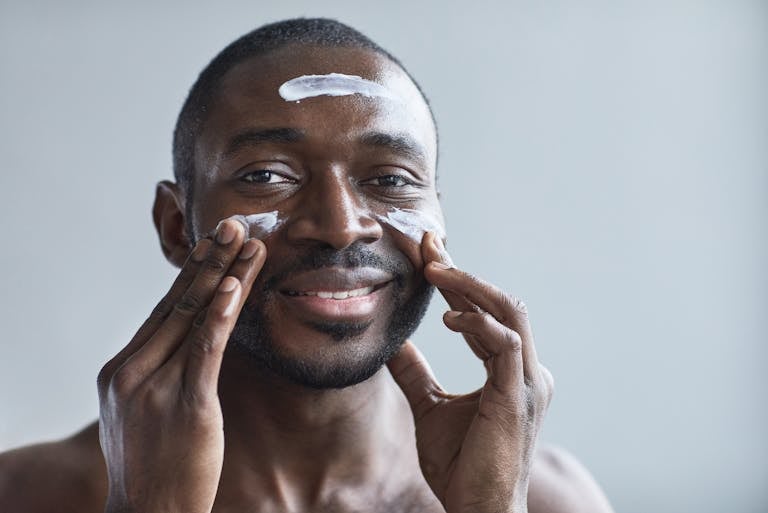Balanced Glow: Homemade Toner Recipes for Combination Skin
Have you ever looked in the mirror and wished for perfectly balanced, glowing skin? If you have combination skin, you know the struggle of dealing with both dry and oily areas. It can be frustrating to find the right products that address your unique skincare needs.
But don’t worry, because I’ve got a solution for you! In this article, I’ll share with you some amazing homemade toner recipes specifically designed for combination skin. These DIY toners will help you achieve that coveted balanced glow, leaving your skin refreshed, hydrated, and radiant.
Whether you’re dealing with excess oiliness, dry patches, or occasional breakouts, these homemade toners will be your new skincare secret weapon. So get ready to say goodbye to those store-bought toners that may not quite meet your needs, and say hello to a personalized skincare routine that works wonders for your combination skin.
Key Takeaways:
- Homemade toner recipes provide a natural and customizable solution for combination skin.
- DIY toners offer the benefits of pH balancing, cleansing, hydration, and nourishment for the skin.
- Experiment with different homemade toner recipes to find the best formulation for your unique combination skin concerns.
- These homemade toners can help you achieve a balanced glow, leaving your skin refreshed, hydrated, and radiant.
- Say goodbye to store-bought toners that may not meet your combination skin’s specific needs.
What Does Face Toner Do?
Face toner plays an essential role in your skincare routine, providing numerous benefits for your skin. Let’s take a closer look at what face toners can do for you:
- Restores pH Balance: After cleansing your face, toner helps restore the skin’s pH balance, which may have been disrupted by the alkaline nature of some cleansers.
- Cleanses and Removes Impurities: Toner effectively cleanses your skin, removing any lingering dirt, makeup, or oil that may have been missed during the cleansing process.
- Hydrates and Moisturizes: By infusing your skin with moisture, toners help hydrate and nourish your skin, leaving it feeling refreshed and revitalized.
- Promotes Smoother Skin: Toner can smooth the surface of your skin, making it appear softer, more refined, and smoother to the touch.
- Infuses Vitamins and Botanicals: Many toners contain vitamins and botanical extracts, providing your skin with an extra dose of antioxidants, vitamins, and minerals for a healthier complexion.
When your skin’s pH is balanced, it can function optimally, protecting itself from environmental stressors and allowing for efficient cell turnover and renewal.
“Using toner in my skincare routine has made such a difference. Not only does it make my skin feel clean and refreshed, but it also helps keep my complexion looking smoother and more radiant.” – Jessica, skincare enthusiast
Does Everyone Need to Use Toner?
Not everyone needs to use toner. Whether or not toner is necessary depends on your skin type and specific skin problems.
If you’re looking to increase hydration without clogging pores, toners with hydrating or humectant ingredients like glycerin or hyaluronic acid can be helpful.
“For those with naturally smooth and radiant skin, using fewer products on the skin, including toner, may be sufficient,” says Dr. Lisa Johnson, a dermatologist at Skincare Solutions.
However, toner can be beneficial for those with oily or acne-prone skin. It helps balance the skin, reducing oiliness and minimizing the appearance of clogged pores.
“Toner also provides additional vitamins and minerals that can support the health and nourishment of the skin,” explains Dr. Johnson.
Expert Tip: Hydration for Combination Skin
“If you have combination skin, it’s important to focus on hydration without exacerbating oiliness. Look for toners with lightweight formulas that provide moisture without feeling heavy or greasy.”
– Dr. Lisa Johnson, Dermatologist
“Toners with ingredients like green tea, aloe vera, and chamomile can help soothe and calm the skin, while still providing the necessary hydration.”
If you’re unsure if you need toner, consult with a dermatologist to determine the best products and skincare routine for your specific skin concerns.
What to Know Before Using Toner
Before incorporating toner into your skincare routine, there are a few important factors to consider. This section will cover key information about dryness, alcohol-free toner, exfoliating products, potential irritation, and the overall impact on your skincare routine.
Dryness and Alcohol-Free Toner
If you’re prone to dryness, it’s essential to choose an alcohol-free toner. Alcohol-based toners can strip the skin of its natural oils, exacerbating dryness and potentially causing irritation. Opting for alcohol-free options helps minimize these concerns and maintain optimal moisture levels for your skin.
Beware of Exfoliating Products
It’s crucial to be mindful of other skincare products, particularly those with exfoliating properties, when incorporating toner into your routine. Using multiple exfoliating products simultaneously can lead to excessive exfoliation, resulting in irritation and potential infection. Balancing the use of exfoliating products with toner is key to avoid over-exfoliating and damaging your skin.
Potential Irritation and Skincare Routine
When introducing toner to your skincare routine, be attentive to any potential signs of redness or irritation. While toner can benefit your skin, each individual may react differently to specific ingredients. If you notice any discomfort or adverse reactions, it’s essential to adjust your routine accordingly. Always prioritize gentle products that strengthen and support your skin’s natural barrier.
| Key Points | Takeaway |
|---|---|
| Opt for alcohol-free toners if you experience dryness. | Alcohol-free toners help minimize skin irritation and dryness. |
| Be cautious of combining multiple exfoliating products. | Excessive exfoliation can lead to irritation and potential infection. |
| Pay attention to any signs of redness or irritation. | Adjust your skincare routine and products if adverse reactions occur. |
To ensure a successful toner experience, understanding these crucial points will help you make informed decisions regarding your skincare routine. By considering your skin’s specific needs and potential sensitivities, you can effectively incorporate toner into your daily regimen.
How to Use Toner
Toner is a crucial step in your skincare routine to achieve fresh, glowing skin. Here’s how you can incorporate toner into your daily regimen:
- Start with Clean Skin: Before applying toner, ensure your face is thoroughly cleansed using a gentle cleanser.
- Gently Pat Dry: After cleansing, pat your skin dry with a soft towel. Avoid rubbing, as this can cause irritation.
- Choose Your Application Method: There are a few different ways to apply toner. You can spray it directly onto your face, neck, and chest, or use a cotton ball or your palms to apply it.
- Give It Time to Absorb: Once you’ve applied toner, allow it to sink into your skin for about a minute. This will ensure optimal absorption and effectiveness.
- Apply Serum and Moisturizer: After the toner has absorbed, follow up with your favorite serum and moisturizer. The toner will help prepare your skin to better absorb these products.
- Don’t Forget Sunscreen: As toner can increase photosensitivity, it’s important to apply a broad-spectrum sunscreen with SPF 30 or higher as the final step in your skincare routine.
- Midday Spritz: Throughout the day, you can use toner as a refreshing face mist to revive your skin or set your makeup. Simply spritz it onto your face whenever you need a quick pick-me-up.
Follow these steps to incorporate toner into your skincare routine and achieve fresh, radiant skin.
Face Toner FAQs
Have questions about face toner? We’ve got the answers! Read on to find out more about how to apply face toner, whether you can use toner on the body, why toner is supposed to burn sometimes, how to add a preservative to toner, and whether you need to wash off toner.
How to Apply Face Toner
To apply face toner, start by cleansing your skin thoroughly. Once your skin is clean and dry, you can either spritz toner directly onto your face or apply it using a cotton ball. Gently pat the toner into your skin, focusing on areas that need extra attention. Allow the toner to sink in for a minute or two before moving on to the next steps in your skincare routine.
Can You Use Toner on the Body?
Yes, you can use toner on the body with similar effects. However, it’s important to note that toners formulated specifically for the face may be pricier than those made for the body. If you’re looking to extend the benefits of toner to your body, consider using a body-specific toner or opting for a budget-friendly alternative.
Why Is Toner Supposed to Burn Sometimes?
It’s not uncommon to experience a mild burning or stinging sensation when using toner, especially if it contains certain active ingredients. This sensation is usually temporary and can vary from person to person. If you find that toner consistently causes discomfort or irritation, it may be best to skip using it for a few days. Instead, focus on using gentle products that can strengthen and support your skin barrier.
How to Add a Preservative to Toner
If you’re making your own homemade toner, adding a preservative can help prolong its shelf life and prevent the growth of bacteria or mold. When choosing a preservative, make sure it is suitable for skincare products and follow the manufacturer’s instructions for proper usage. This will ensure that your toner remains safe and effective for use over time.
Do You Need to Wash Off Toner?
No, toner does not typically need to be washed off. After applying toner, allow it to fully absorb into your skin before moving on to the next steps in your skincare routine. This will ensure that your skin benefits from the toner’s hydrating and balancing properties. However, if you prefer to wash off the toner, you can do so using warm water and a gentle cleanser.
| Toner Type | Key Benefits |
|---|---|
| Alcohol-based Toner | – Can be drying – May help control excess oil – Suitable for oily or acne-prone skin |
| Hydrating Toner | – Provides an extra layer of hydration – Soothes and calms the skin – Suitable for dry or dehydrated skin |
| Exfoliating Toner | – Helps remove dead skin cells – Improves skin texture and tone – Suitable for dull or congested skin |
| pH Balancing Toner | – Restores the skin’s natural pH level – Prepares the skin for subsequent skincare products – Suitable for all skin types |
19 Homemade Face Toner Recipes
Creating your own homemade toner is a fantastic way to personalize your skincare routine and target specific skin concerns. Whether you have normal skin or you’re looking for a firming toner, a vitamin C toner for brightening, or a hibiscus toner mist for anti-aging benefits, there’s a DIY toner recipe for you. Here are 19 homemade toner recipes that can help you achieve glowing and healthy skin:
All-Purpose Toner for Normal Skin:
- Witch hazel
- Lavender or rosewater
- Distilled water
- Essential oils
Firming Toner:
- Frankincense essential oil
- Hydrosol
- Glycerin
Vitamin C Toner:
- Citrus fruit peels
- Witch hazel
- Boiling water
Hibiscus Toner Mist:
- Hibiscus infusion
- Witch hazel
DIY Toner for Glowing Skin:
- Aloe vera
- Essential oils
- Rose water
Other Homemade Toner Ingredients:
- Apple cider vinegar
- Green tea
- Cucumber
- Cranberry
- Rice water
These homemade toner recipes can address a variety of skin concerns, including dryness, natural glow, acne scars, large pores, combination skin, and hyperpigmentation. Feel free to experiment with different ingredients and ratios until you find the perfect toner formulation for your unique skin needs.
| Toner Recipe | Skin Concerns |
|---|---|
| All-Purpose Toner for Normal Skin | General hydration and balance |
| Firming Toner | Sagging or aging skin |
| Vitamin C Toner | Brightening and evening out skin tone |
| Hibiscus Toner Mist | Anti-aging and antioxidant protection |
| DIY Toner for Glowing Skin | Enhancing natural radiance |
| Other Homemade Toner Ingredients | Dryness, acne scars, large pores, combination skin, hyperpigmentation |
With these homemade toner recipes, you can take control of your skincare routine and give your skin the nourishment it deserves. Remember to perform a patch test before applying any new homemade toner to ensure compatibility with your skin. Enjoy the process of creating your own personalized toners and reap the benefits of glowing, healthy skin!
Does DIY Toner Work?
DIY toners can be an effective alternative to store-bought toners. They offer the benefit of using natural ingredients without the inclusion of harmful chemicals. Many people prefer DIY toners because they can tailor the formulations to their specific skin concerns and preferences.
On the other hand, store-bought toners often contain preservatives to extend their shelf life, which may not be preferred by individuals looking for natural options. These preservatives can sometimes cause skin irritations or allergic reactions in sensitive individuals.
Whether DIY toners or store-bought toners work for you depends on your individual preferences and skin concerns. It’s essential to consider your specific skin type and any existing skin issues before determining which type of toner to use.
If you have concerns about dryness, acne, hyperpigmentation, or other skin conditions, it’s always advisable to consult with a dermatologist. They can provide personalized recommendations and guidance based on your unique needs.
Conclusion
Creating homemade toners can be a fantastic solution for individuals with combination skin. By using natural ingredients like witch hazel, raw apple cider vinegar, essential oils, and rose water, you can customize your toner to address your specific skin needs. DIY toners offer the benefits of pH balancing, cleansing, hydration, and nourishment, providing a holistic approach to skincare.
With homemade toners, you have the freedom to experiment with various recipes to find the perfect formulation for your unique combination skin concerns. Whether you’re trying to control excess oil in your T-zone or combat dryness on your cheeks, there is a toner recipe out there that can help you achieve the balance you desire.
So, why settle for store-bought toners when you can create your own natural and effective toner at home? Embrace the world of homemade toner recipes and discover the joy of taking care of your skin with ingredients that you trust. Say goodbye to guesswork and hello to a healthy glow by incorporating homemade toners into your skincare routine.
FAQ
What does face toner do?
Face toner helps to restore the skin’s pH balance after cleansing and remove any remaining dirt, makeup, and oil. It also hydrates the skin, making it appear smoother. Additionally, toners can infuse the skin with vitamins and botanicals, providing a boost of antioxidants, vitamins, and minerals.
Does everyone need to use toner?
Whether or not toner is necessary depends on the individual’s skin type and specific skin problems. For those looking to increase hydration without clogging pores, toners with hydrating or humectant ingredients like glycerin or hyaluronic acid can be helpful. However, toner can be beneficial for those with oily or acne-prone skin by balancing the skin and reducing oiliness. It can also provide additional vitamins and minerals for those with lacking skin.
What to know before using toner?
For individuals prone to dryness, using an alcohol-free toner can help minimize potential irritation of the skin. It’s important to be aware of the other products being used, especially those that exfoliate. Using too many exfoliating products in the same routine can lead to irritation and potential infection. It’s always recommended to utilize gentle products to strengthen and support the skin barrier, and be cautious of any signs of redness or irritation when using toner.
How to use toner?
Toner is best applied to fresh skin once or twice daily. After washing the face and gently patting the skin dry, toner can be sprayed on the face, neck, and chest or applied using a cotton ball or palms. It’s important to allow the toner to sink in for about a minute before applying serum or moisturizer. It’s also essential to follow up with sunscreen to prevent any potential photosensitivity. Toner can also be applied throughout the day by spritzing as a face mist to refresh the skin or revive makeup.
Face toner FAQs
Face toner should be applied twice a day, just after cleansing the skin, but before applying other skincare products. It can be spritzed directly on the face or applied with a cotton ball. Toner can also be used on the body with similar effects. However, it’s important to note that toners formulated for the face may be pricier than those made for the body. When using toner, some individuals may experience a mild burning or stinging sensation, depending on the ingredients. If this occurs, it’s best to skip using toner for a few days and apply gentle products to strengthen and support the skin barrier. Adding a preservative to toner can help prolong its shelf life, and it’s possible to wash off toner.
Are there any homemade toner recipes?
There are various homemade toner recipes suitable for different skin types. Some examples include an all-purpose toner recipe with witch hazel, lavender or rosewater, distilled water, and essential oils for normal skin. A firming toner can be made with frankincense essential oil, hydrosol, and glycerin. A vitamin C toner with citrus fruit peels, witch hazel, and boiling water is beneficial for brightening the skin. A hibiscus toner mist provides anti-aging benefits with hibiscus infusion and witch hazel. Additionally, DIY toners with ingredients like aloe vera, rose water, apple cider vinegar, green tea, cucumber, cranberry, and rice water can be used for various skin concerns including dryness, natural glow, acne scars, large pores, combination skin, and hyperpigmentation.
Does DIY toner work?
DIY toners can be effective and offer the benefit of using natural ingredients without harmful chemicals. Store-bought toners may contain preservatives, which can extend their shelf life but may not be preferred by those looking for natural options. Whether DIY toners or store-bought toners work depends on individual preferences and skin concerns. It’s always advisable to consult with a dermatologist for specific skin issues and recommendations for toners.
Source Links
- https://helloglow.co/ways-to-make-homemade-toner/
- https://www.healthline.com/health/beauty-skin-care/diy-toner
- http://thedandyliar.com/diy-glow-toner-glowing-skin/







